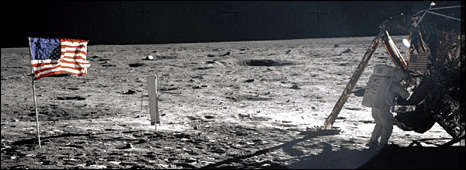The Controversy Around Neil Armstrong’s Famous Quote

On July 20, 1969, the Apollo 11 mission crew made its descent to the moon. Neil Armstrong exited the lunar lander and took the first step onto the piece of rock orbiting 225,000 miles above the Earth. As he did, he proclaimed words that will be repeated for time immemorial: “That’s one small step for man, one giant leap for mankind.” The Apollo 11 mission was a flawless success.
Okay, nearly flawless. There was one notable error: Neil Armstrong flubbed his line.
Armstrong knew that his now-famous quote, which one can listen to here, would become an iconic part of the lore of space exploration, and indeed, humanity. We don’t know, exactly, when he came up with the words he intended to use upon landing; what we do know is that that intended to say “That’s one small step for a man, one giant leap for mankind.” Yes, there’s an “a” before “man.” From a linguistic approach, the intended statement makes more sense. “Man,” without the article “a,” is synonymous with “mankind,” and therefore, the quote as spoken is apparently contradictory. While Armstrong probably wasn’t worried about such things while taking the first steps on the moon, such concerns did come to him upon his return.
Upon returning to Earth and finding that the quote did not have the “a” in it, Armstrong, as reported by the New York Times (pdf), offered a correction and explanation:
When Armstrong saw the quotation [. . .] in the mission transcript after his return to earth, he said it was misquoted, it was reported yesterday [July 30, 1969].
There should have been the article “a” before “man,” the astronaut said.
The “a” apparently went unheard and unrecorded in the transmission because of static, a spokesman for the Manned Spacecraft Center in Houston said in a telephone interview.
(Strangely, if you read the full article linked to above, you’ll find that the Times flubbed the “corrected” quote — twice. They have it as a “giant step,” not “leap,” and then say “makind,” not “mankind.”)
Yet this attempt to change the course of history — or, at least, of Bartlett’s Familiar Quotations — did not succeed. The recording is much clearer than the excuse offered by NASA would allow, and few believed Armstrong’s claim that the transcript was incorrect. Over time, Armstrong came around to the truth — the recording and transcript were accurate, and he simply omitted the word accidentally. In 2005, he told James Hansen, the author of a biography of Armstrong titled First Man, “It doesn’t sound like there was time for the word [“a”] to be there. So I would hope that history would grant me leeway for dropping the syllable and understand that it was certainly intended, even if it wasn’t said – although it might actually have been.”
But even with that, the controversy raged for a few years. In 2006, a hobbyist used off-the-shelf voice editing software and, while reviewing the recording, “[his] audio analysis was able to find the signature of the missing word” per the BBC. (Armstrong briefly held out hope that this test was correct, calling the conclusions “persuasive.”) Unfortunately for Armstrong, a 2009 study by a linguistics expert — the “most detailed analysis yet of Neil Armstrong’s speech patterns,” per another BBC article — concluded that Armstrong proclaimed his walk to be a “small step for man,” generally, and not “a small step for a man.”
But given that Armstrong had been rocketing through space, awake for 24 hours straight and, by the way, was walking on the moon, we think he deserves a pass, regardless.
Bonus fact: Apollo 12 landed on the moon on November 19, 1969. Its commander, Pete Conrad, became the third person (after Armstrong and Buzz Aldrin from Apollo 11) to walk on the moon. Conrad’s first words on the moon? Per NASA: “Whoopee! Man, that may have been a small one for Neil, but that’s a long one for me.” Conrad spoke that less-than-poetic quip in order to prove to an Italian journalist that NASA did not script Armstrong’s (or his) lines. In doing so, Conrad won a $500 bet with the journalist, but he never did collect on his winnings.
From the Archives: Mission to Nowhere: The bonus fact discusses how Neil Armstrong almost missed out on the opportunity to become the first person on the moon.
Related: “First Man: The Life of Neil Armstrong” by James Hansen. Four stars on nearly 100 reviews. Available on Kindle.

Leave a comment